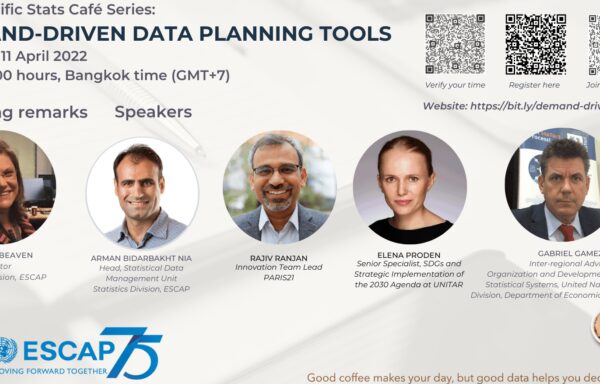Presenting StaTact at Asia-Pacific Stats Café Series: Demand-driven Data Planning Tools
Apr 11, 2022
Location

11 April 2022 - Policymakers and Data producers tend to work in silos, disconnected from one another, preventing them to benefit from the synergies and benefits collaborative efforts would bring, especially to advance the SDGs and ensure No One is Left Behind.
To address this disconnect, UNESCAP, PARIS21 and UNITAR respectively developed EPIC, ADAPT and StaTact, three free-standing and complementary data-planning tools intervening at different stages of the data production process and concerned with multi-stakeholder collaboration.
This session of the Asia-Pacific Stats Café on the 11th of April 2022 was dedicated to introducing the three tools and how they can support national statistical systems in identifying data gaps and developing strategic planning to address them. Mr. Arman Bidarbakht Nia, Head of the Statistical Data Management Unit of the Statistics Division at ESCAP, Mr. Ravij Ranjan, Innovation Team Lead at PARIS21, Ms. Elena Proden Senior Specialist at the Strategic Implementation of the 2030 Agenda Unit of UNITAR were invited to the discussion moderated by Mr. Gabriel Gomez, Interregional Adviser of the Organization and Development of National Statistical Systems at UNSD.
Every Policy is Connected or EPIC first aims to identify the key indicators relevant to national policy priorities incl .specific policies, by analyzing policy documents and refining those if vulnerabilities are uncovered. Based on these findings, a comprehensive indicator framework can then be developed. During this process, global and regional commitments and indicators are also integrated into national indicator frameworks.
With the support of UNESCAP and the use of the EPIC tool, Samoa as one of the active users of EPIC, was able to develop national indicators for the tourism sector.
Advanced Data Planning Tool or ADAPT was developed both to undertake exhaustive data inventory in order to identify key data gaps highlighted as relevant to a specific policy or sector, and to build sound comprehensive data plans to fill in these gaps.
ADAPT can be mobilized in different contexts. Countries may require assistance with their SDG readiness and SDG domestication, monitoring their National Development Plans or some specific sectoral data plans. PARIS21 worked with National Statistical Systems in the Philippines to support the production of subnational gender data for example.
This freed cloud-based application also allows National Statistical Systems to share information efficiently, transparently and safely. More than 30 countries have already used ADAPT to further their data planning activities!
StaTact, standing for Statistical Tactics & Action, aims to address the most pressing data gaps preventing the advancement of a specific policy. It uses short-term action planning and cost-effective solutions and helps operationalize strategies.
This action-oriented, tactical and consultative tool is composed of four phases. The Problem Statement helps refine the problem and strengthen the business case to highlight urgency and relevance. Two statistical models GAMSO and GSBPM are then mobilized during the Problem Analysis phase to identify key indicators and data sources relevant to the data problem. The Action Plan allows specifying the different tasks and actions necessary to achieve selected solutions. Finally, the Implementation phase can be launched and monitored. The tool has been used by more than 40 countries, including the Philippines and Samoa as ADAPT and EPIC.
EPIC, ADAPT and StaTact all bring something to address the policymaker-data producer disconnect. The three tools help structure the reflection process and bring different groups of people together to change the way data is produced and used and build pertinent solutions. The joint diagram developed by the tool providers explains where and how these three tools can be of use and come in to identify data priorities, develop national statistical strategies and bridge the data gaps.
The Q&A session allowed speakers and attendees to discuss the need for a mindset shift in regard to how data needs are approached and how data is produced. As collaborative tools, EPIC, ADAPT and StaTact indeed have the potential to support continuous joint efforts between data users and data producers.
For more information on this session and to access the presentation, please visit this page or watch the recording.
